Some time ago, on a visit to Eastern Europe, I came into contact with the amazing diversity of Slavic cultures. For starters, in Poland I met a Polish priest who felt the need to speak to me in Latin because we didn’t share a common language. We were both Latin Rite Catholics, so it made sense, right?
Well, not exactly. My high school Latin didn’t rise to the occasion. I responded to his inquiries with a few Latin non sequiturs like “carpe diem” and “persona non grata” and “tempus fugit” and the like. I noticed the good Father made the Sign of the Cross a lot.
When I traveled through western Ukraine and Moldova with a mission group, I could not understand a single word anyone said – not even one – because we were not in Latin Church territory any more. In fact, I couldn’t even read the signs because even the alphabet was completely different from ours. Thankfully, the group did have an efficient translator who knew English well enough to even laugh at a few of my jokes. (Very few, actually.)
Finally, we crossed the border into Romania where I could actually read the alphabet but couldn’t understand the language behind the alphabet. What an education I got in language and culture.
When I finally got on a plane and landed at John F. Kennedy Airport, I was never so happy to hear New York-ese spoken in my life!
The Power of Alphabets
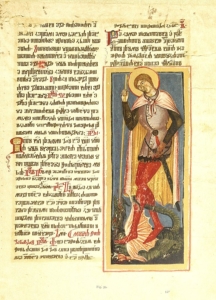 Language is critical for living, isn’t it? As my opening story indicates, we generally appreciate the gift of language most when we are deprived of it or find ourselves like a fish out of water in a language system we do not understand.
Language is critical for living, isn’t it? As my opening story indicates, we generally appreciate the gift of language most when we are deprived of it or find ourselves like a fish out of water in a language system we do not understand.
It may be, though, that alphabets are even more important than language because alphabets create written languages. The organized systems of symbols on a page that we call words and phrases turn our oral transmissions into writings, which societies use to create civilizations.
Alphabets have amazing power.
The Apostles to the Slavs
This is fundamentally what the two brothers, Saints Cyril and Methodius, did in Central Europe in the mid-800s AD. (For our regular readers, that was just after the Book of Kells was created.) The brothers gave the Slavs not a language, which the people already had, but an alphabet to write it down in and so hand their culture and faith on to succeeding generations.
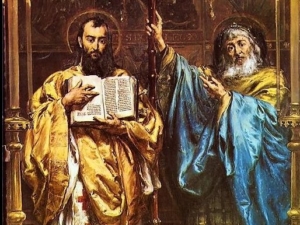 To give you an idea of the effect of the brothers’ action, this same alphabet forms the basis of at least fifty written languages used today. Modern Russian, Belarusian, Ukrainian, Bulgarian, Macedonian, Montenegrin, Serbian, Bosnian/Herzegovinian, and even Mongolian, among others, all owe their existence to these brothers who evangelized the Slavic peoples with an alphabet – and a liturgy, as we’ll see below.
To give you an idea of the effect of the brothers’ action, this same alphabet forms the basis of at least fifty written languages used today. Modern Russian, Belarusian, Ukrainian, Bulgarian, Macedonian, Montenegrin, Serbian, Bosnian/Herzegovinian, and even Mongolian, among others, all owe their existence to these brothers who evangelized the Slavic peoples with an alphabet – and a liturgy, as we’ll see below.
Even though they were Greeks, Cyril and Methodius are considered the fathers of Slavic culture, such an integral part of European identity that in 1980 Pope John Paul II named them co-Patrons of Europe together with St. Bridget of Sweden, St. Benedict, St. Catherine of Siena, and St. Teresa Benedicta of the Cross.
John Paul’s 1985 encyclical, Slavorum Apostoli, states that these brothers literally “planted the Church of God” in the fertile soil of the Slavic nations. Very few people in history can claim such an accomplishment.
Holy Missionaries
Both brothers were born in Thessalonica, Greece (Methodius in 815 AD, Cyril in 827) but in their early adult years moved to a monastery near Constantinople, modern day Istanbul, to become monks.
The language abilities and missionary output of these brothers were unbelievable. While living their monastic life, they also took up missionary work. They learned the Khazar language (a Turkish dialect!) in order to evangelize the Saracens who lived in that region near the Black Sea.
They were so successful in their missionary efforts that the Byzantine Emperor, Michael III, sent them to the Balkans when he received a request for missionaries from Rostislav, Prince of Great Moravia (roughly today’s Czech Republic and Slovakia – the map below is an outline of the medieval kingdom of Great Moravia superimposed on a map of modern Europe.) He had no better missionaries to send than the two Greek brothers, who already had a well-established track record of scholarship, languages, and missionary zeal.
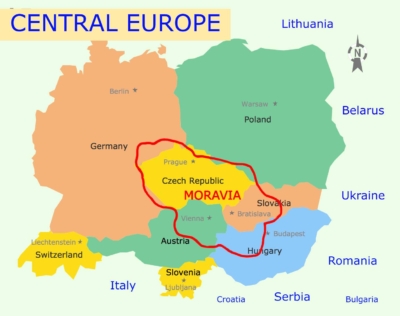
Cyril is reported to have responded to the Emperor’s request: “However tired and physically worn out I am, I will go with joy to that land…with joy I depart for the sake of the Christian faith.” That kind of generosity is characteristic of what we call a saint. So, in 863 AD the brothers traveled westward more than 1100 miles to begin their great Central European adventure.
I often marvel at the goodness and generosity of missionaries of bygone eras who gave up everything to bring Christ to other nations. Often, when they left their own lands, they never saw their families again. Needless to say, in the 9th century, it wasn’t possible for Cyril and Methodius to just hop on a plane and go home to Thessalonica for Christmas.
Language and Liturgy
During their first four years in Moravia they made no attempt to impose their superior Greek culture or language on the people but rather learned the local Slavic language and created an alphabet so the people could learn to read.
They proceeded to translate the entire Bible as well as the liturgy into that language so the people could worship and have the word of God proclaimed to them in their own tongue. Those who accuse the Catholic Church of being anti-biblical simply do not know history.
Then the brothers strengthened their evangelizing efforts by establishing what was called the Great Moravian Academy to teach literacy to the people. Did those men even sleep?
The Cyrillic Alphabet
St. Cyril is credited with creating the alphabet that would eventually bear his name (originally it was called Glagolitic). His basic challenge was that many of the sounds of the Slavic tongue couldn’t be written with the Greek alphabet – it didn’t have enough letters! So, using the 24 letters of the Greek as his base, Cyril expanded the new alphabet to 43.
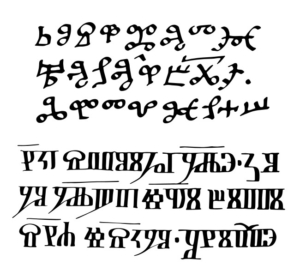 Over time, Slavic languages “simplified” the alphabet to only 30 or 33 letters. Here is an example of what Cyril’s original alphabet looked like. It is often called “Old Church Slavonic” due to its use in the liturgy.
Over time, Slavic languages “simplified” the alphabet to only 30 or 33 letters. Here is an example of what Cyril’s original alphabet looked like. It is often called “Old Church Slavonic” due to its use in the liturgy.
Cyril had to borrow or invent letters in order to create his new alphabet. For example, Greek doesn’t have the “sh” or “tz” sounds of the Slavic tongue, so Cyril apparently borrowed those letters from the Hebrew alphabet. Others letters of his alphabet resemble cyphers from Coptic, Armenian, Phoenician, and Aramaic. And the rest he made up out of whole cloth!
When challenged by the leaders of the established Church of his day about creating a liturgy in the language of the people, Cyril replied:
“Are you not ashamed to decree only three languages (Hebrew, Greek and Latin), deciding that all other peoples and races should remain blind and deaf! Tell me: do you hold this because you consider God is so weak that he cannot grant it, or so envious that he does not wish it?”
My kinda missionary! Cyril died in 869 at the relatively young age of 42 but not before seeing papal approval of the Old Slavonic liturgy he had created for his beloved Slavic people.
The Tree Bears Great Fruit
Soon after, Pope Adrian III appointed Methodius as the first archbishop of the new Slavonic-speaking diocese, and Methodius lived for sixteen more challenging years after Cyril died.
He encountered fierce resistance from Latin Rite churchmen who resented his successful new approach to evangelization. Unbelievably, he was physically attacked and even imprisoned (by fellow clerics) for almost three years in gratitude for all the good he had done for the Church!
After Methodius died in 885, his followers were literally kicked out of the territory of Great Moravia, but their dispersion had an unintended positive effect. They went east.
Most notably, Boris I of Bulgaria welcomed them with open arms. When he received baptism in 864 his whole nation converted to Christianity overnight. After that, Cyril’s alphabet became the official written language of Bulgaria.
About eighty years later, the Old Slavonic liturgy so impressed representatives of the Russian Prince Vladimir (not Putin) that they returned to Russia claiming Christianity to be the greatest religion known to man.
In 966, Vladimir was baptized, and all the Slavic peoples of the Great Rus’ (modern day Russia-Ukraine-Belarus) were converted to Christ. The ironies of history.
And all because of an alphabet.
———-
[Note: This article is a reproduction of the Sacred Windows Email Newsletter of 3/20/22, so it does not end with the regular Soul Work section. Please visit our Newsletter Archives.]
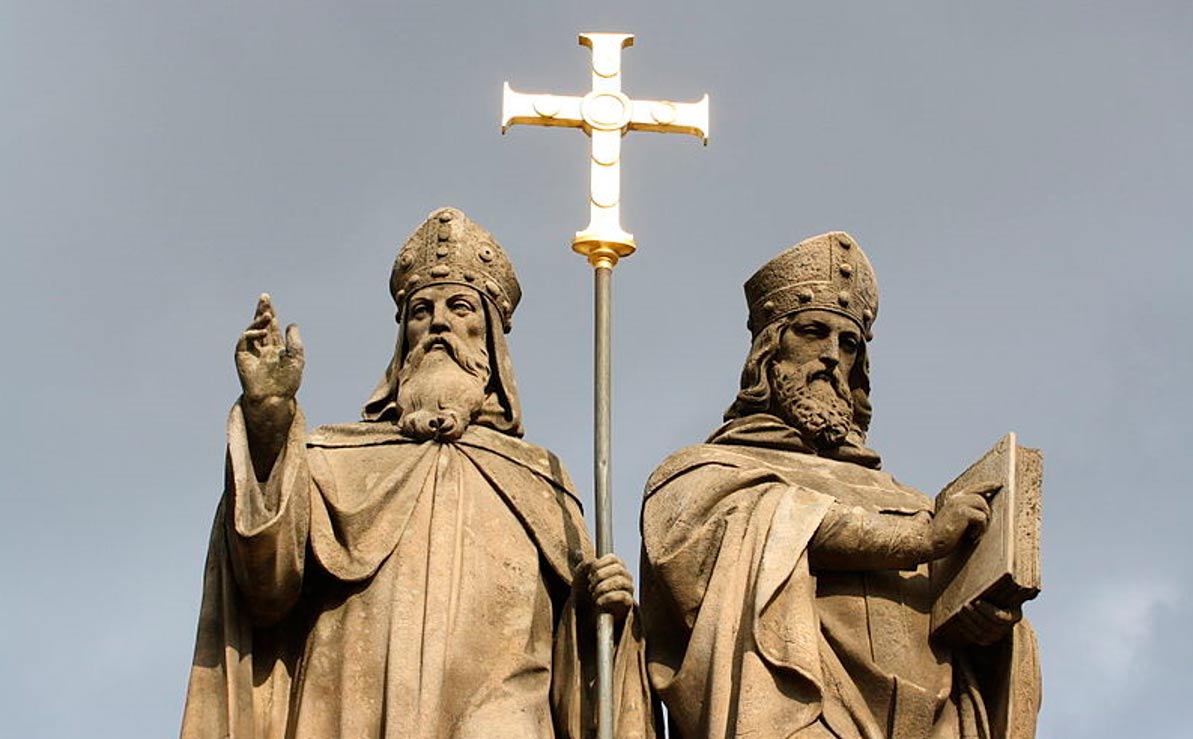
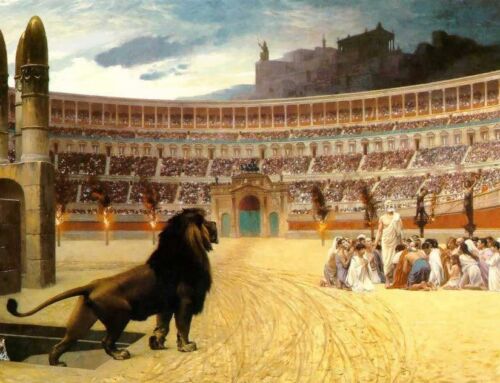
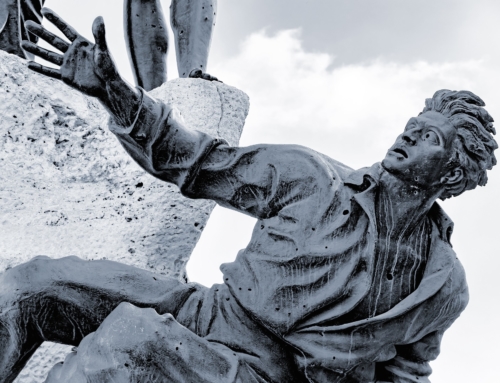
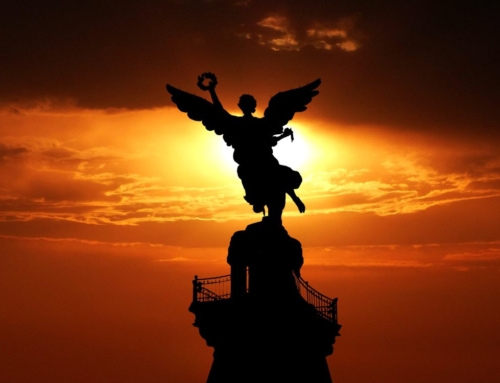
[…] Cyril and Methodius (9th century) – the two Greek brothers who evangelized the Slavic peoples and are known to history as the “Apostles to the […]